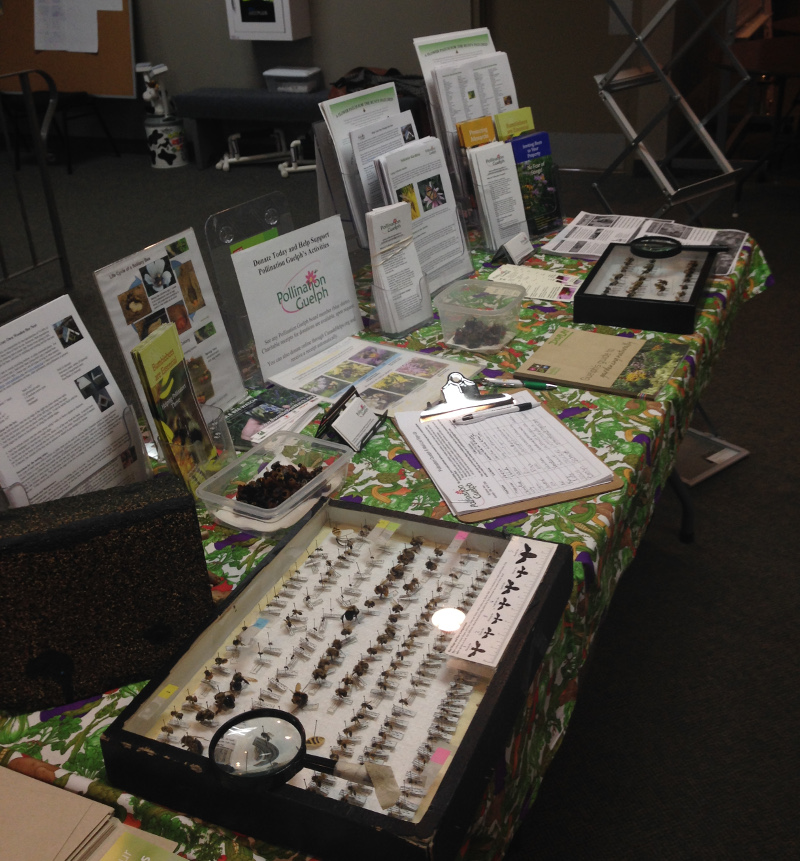The 10th Annual Pollination Guelph Symposium

Kim Fellows
Victoria MacPhail welcomed us with updates on the activities of volunteer-run Pollination Guelph. Perhaps the most ambitious of their many activities is the creation of the Eastview Pollinator Park in the decommissioned Eastview Landfill site. At 45 hectares (112 acres), it is one of the first and largest pollinator parks in Ontario, and internationally! Unfortunately, they had low germination rates at the garden last year, and Victoria discussed possible reasons for that, including competition from established species, methane escape from the landfill, and last summer’s harsh growing conditions.
We were entertained with a 19-minute film screening called A Ghost in the Making, which documents the story of the Rusty-patched bumble bee, and does an excellent job explaining the issues that surround honeybee and native bee population declines. One of the film’s most important messages is the difference between the declines of honey bees (which are not at risk of extinction) and those of some native bees, which are at risk. We also explored this topic in an article in last month’s ebulletin. Nine of 24 known bumblebee species in Canada are considered vulnerable: that’s more than a third of our native bumble bee species. Those wanting to support bumblebee populations can help researchers by taking part in Bumblebee Watch.
Radek Odolczyk from the Aderville First Nations Black Oak Savanna (AFNBOS ) explained that tallgrass prairies and savannah are endangered grassland ecosystems. Located south of Rice Lake, on the eastern edge of the Oak Ridges Moraine, the AFNBOS is the largest single remaining parcel of its kind in east-central Ontario. A recent survey of the area counted more than 850 animal species, of which approximately one quarter were pollinators! The project aims to return native species to lands previously used for crops.
Lorne Widmer, Project Management Specialist at the Ontario Ministry of Agriculture, Food and Rural Affairs, reviewed Ontario’s Pollinator Health Action Plan, which we have also outlined in a previous article.
Jen Baker told us about the Hamilton Pollinator Paradise, which aims to create an uninterrupted haven of native plants that will provide food and shelter for pollinators across the city of Hamilton, Ontario.
The symposium’s keynote speaker was Toronto author Lorraine Johnson, who recently updated her book 100 Easy-to-Grow Native Plants for Canadian Gardens. Lorraine regaled us with photos and descriptions of some of her favourite native plants. It may surprise you to know that the pawpaw (Asimina triloba) tree features the largest native edible fruit in Ontario. It is about the size of a mango, and tastes like a bit like a cross between a banana and pineapple!
Christina Kingsbury and Anna Bowen returned to update us on their ReMediate project, mesmerizing us with beautiful art and poetry. Karen McKeown encouraged everyone to plant a garden instead of a front lawn, while Alison Maxwell reviewed rain gardens. Kat Granger reminded us of the hibernating and pupating insects in the soil, and and a good way to support their habitat via “lasagna gardening.” Heather Holm has released a second book called Bees: An Identification and Native Plant Forage Guide. You can order it online from Pollination Guelph for some springtime reading!
Happy Gardening!
**
Kim Fellows is the outreach coordinator of Pollination Canada.
Photo: Display table at the 10th Annual Pollination Guelph Symposium, March 25, 2017.
Not yet a member?
An annual membership to Seeds of Diversity gives you access to our seed exchange, seed grow-out programs, and our online news.

We depend on donations to do our work.

Thank you for your support!
